In today’s fast-paced digital landscape, having the right tools isn’t just helpful—it’s essential. Whether you’re a solo entrepreneur or part of a large agency, your digital marketing toolkit can determine the success or failure of your campaigns. With so many platforms and apps available, knowing which ones are truly worth your time and money can make a huge difference in how efficiently you manage your strategy. This article highlights the core tools every marketer should have to build, analyze, and optimize their digital presence.
If you’re exploring ways to build your online brand while sharing expertise, you can also write for us on topics like marketing tech, strategy, and trends.
1. Content Creation And Planning Tools
Every successful digital marketing campaign starts with strong content. To consistently produce high-quality blogs, videos, infographics, and social posts, you need content creation tools that save time and inspire creativity.
Platforms like Canva are indispensable for quick and beautiful graphics. Grammarly ensures your writing is polished and error-free, while tools like Hemingway help maintain clarity and readability. When it comes to planning, Trello and Notion make content calendars easy to manage and collaborate on, especially for teams working remotely.
These tools help marketers stay on top of publishing schedules, maintain consistency across channels, and reduce time spent on revisions.
2. SEO And Keyword Research Tools
Search Engine Optimization remains at the core of digital visibility. Without SEO tools, marketers are left guessing what their audience is searching for. Tools like SEMrush, Ahrefs, and Ubersuggest allow you to find the best keywords, monitor your competitors, and track your ranking progress.
Google Search Console and Google Analytics are free, powerful resources to monitor your website’s performance and discover how users are interacting with your content. Understanding which terms bring people to your site and how they behave once they arrive is key to refining your strategy.
If you’ve been looking for a way to share SEO tips with others in the industry, consider submitting a guest post to platforms focused on marketing insights.
3. Social Media Management Platforms
Managing multiple social accounts is a time-consuming task without proper automation. That’s where social media management platforms like Buffer, Hootsuite, and Later come in. These tools allow you to schedule posts, monitor engagement, and generate performance reports all in one place.
These platforms often integrate with major channels like Facebook, Instagram, LinkedIn, and X (formerly Twitter), providing a seamless way to keep your brand’s message consistent across networks.
They also allow marketers to listen to their audience, jump in on trending conversations, and adapt messaging based on what resonates most.
4. Email Marketing And Automation
Despite being one of the oldest digital marketing strategies, email marketing continues to deliver impressive ROI. Email platforms like Mailchimp, ActiveCampaign, and ConvertKit are user-friendly solutions for creating, automating, and segmenting email campaigns.
These tools offer features like drag-and-drop editors, audience segmentation, automated workflows, and detailed performance analytics. They help marketers nurture leads, re-engage past customers, and drive consistent conversions.
Pairing email tools with customer data platforms enhances personalization—crucial for standing out in crowded inboxes. Many businesses even use these tools to offer a guest post service and promote exclusive subscriber content.
5. Analytics And Reporting Tools
Measuring results is just as important as implementing strategies. Without proper data, it’s impossible to know what’s working—or where you’re losing time and budget. Platforms like Google Analytics, Hotjar, and Data Studio enable marketers to track performance and user behavior with precision.
These tools show where your visitors are coming from, which pages keep them engaged, and where they drop off. Heatmaps and session recordings from Hotjar, for instance, provide visual insight into how users interact with your site.
By using reporting dashboards, marketers can create custom visual summaries of performance data, making it easier to communicate ROI to clients or stakeholders.
If you run a digital website and are open to showcasing analytics strategies, inviting others to contribute could enrich your content while building authority.
Final Thoughts
A well-equipped digital marketing toolkit is more than just a collection of software—it’s a foundation for growth, consistency, and efficiency. From content creation to analytics, each tool serves a unique purpose that collectively helps marketers build and maintain a strong online presence. Remember, the best tools are those that suit your team’s needs, scale with your business, and integrate seamlessly with your workflow. And if you’re passionate about sharing insights or tools with a wider audience, don’t hesitate to explore guest posting opportunities—it’s one of the smartest ways to grow your network and establish authority in the field.
We suggest you to read below trending posts
- The Rise Of Micro-Influencers And What It Means For Your Brand?
- Beyond Likes: How To Build Real Engagement On Social Media?
- How the Dollar Rate Impacts Real Estate Sector of Pakistan

